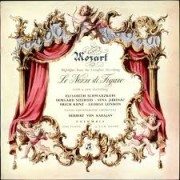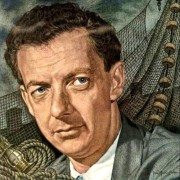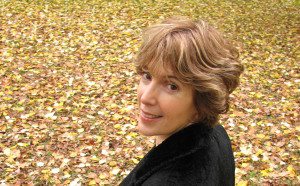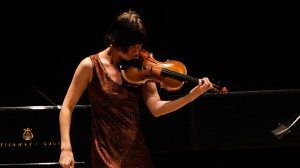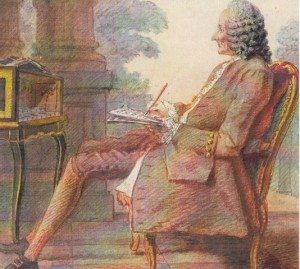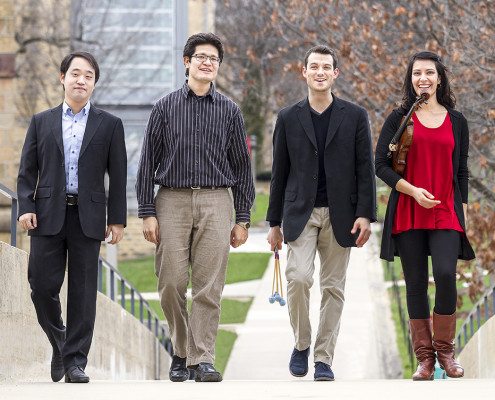
L-R:
Kangwoo Jin, piano; Luis Alberto Peña, piano; Garrett Mendelow, percussion; and Paran Amininazari, violin. Photograph by Michael R. Anderson.
A percussionist, a violinist, two pianists and a composer will take the stage on Feb. 14 at the UW-Madison School of Music, when the school offers its annual “Symphony Showcase,” a night of joy and musical revelry celebrating winners of our annual concerto competition. The concert is open to the public.
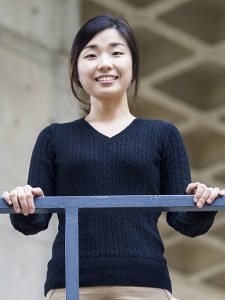
Yunkyung Hong, composer. Photograph by Michael R. Anderson.
The concert takes place in Mills Hall at 7:30 PM on February 14, Valentine’s Day, which falls on a Sunday, and will be followed by a reception in Mills Hall lobby.
Winning students will solo with the UW Symphony Orchestra, conducted by James Smith.
While tickets for children and students are free, tickets for adults are $10.00. Tickets are sold at the Memorial Union Box office on Langdon Street and in Mills lobby day of show. A $4 fee is added to online sales. Please note: We recommend that patrons arrive early to buy a ticket in the lobby.
Box Office link: Buy online ($4 fee).
Free parking (every Sunday) is available at the Business School/Grainger Hall parking lot, diagonally across University Avenue from Humanities.
2016 winners include:
Violinist Paran Amininazari, 31, a doctoral student of assistant professor Soh-Hyun Park Altino, performs with the Madison Symphony Orchestra, is the concertmaster of the Middleton Community Orchestra and is also the artistic director of the new summer chamber group, the Willy Street Chamber Players. At UW-Madison, she is also a member of the Hunt Quartet, sponsored by the Madison Symphony Orchestra and Dr. Kato Perlman. She will play a movement of Sergei Prokofiev’s Violin Concerto No. 2 in G minor, Op. 63, written in 1935, which contains a Russian folk melody in the first and second movements and ends in a Spanish-tinged theme, complete with castanets. Amininazari has an undergraduate degree from the New England Conservatory of Music and attended the Orchestral Skills Program at the University of Nevada-Reno.
Composer and South Korean native Yunkyung Hong, 31, is a doctoral candidate in composition, studying with professors Laura Schwendinger and Stephen Dembski. “Yun” received her undergraduate degree from the University of Texas at Austin where studied composition with Russell Pinkston, Yevgeniy Sharlat, and Donald Grantham. At the University of Florida, she studied composition with James Paul Sain and Paul Koonce and received a master’s degree.
She has presented her music at The Society for Electro-Acoustic Music in the United States (SEAMUS); Sejong Chamber Center (Korea); Unbalanced Concerts, University of Florida; Wet Inks, University of Texas at Austin; and has been commissioned by the Berliner Ensemble Essenz, Ensemble Mise-en at Illinois State. She has also won awards at the Out of Bounds Ensemble, the Mullen Sacred Music Composition at UW-Madison, the University of Missouri Kansas City composers competition and the American Prize chamber music division. In Madison, Yun is now employed as a sound designer for UW-Madison’s “Moocs” program. Her winning composition, titled “Translucency,” includes four movements that reflect the life cycle of a living organism. For the winners recital only the first movement will be performed. “This first movement is about blossoming,” Yun says. “At the opening, we will hear a musical depiction of seeds fluttering in the wind, then gradually this material will develop and blossom at the arrival. The movement is focused on textural and coloristic alterations.”
Pianist and Collins Fellow Kangwoo Jin, 34, a doctoral student of professors Christopher Taylor and Jessica Johnson, is a native of South Korea who has won numerous competitions, including the Korea-Herald Newspaper Competition, the Eumyoun piano competitions, plus the Beethoven Piano Competition at UW-Madison, sponsored by former Chancellor Irving Shain. He also performed a debut concert sponsored by the Chosun Daily Newspaper in Korea. Jin received an undergraduate degree from Hanyang University in South Korea and a master’s degree from Indiana University, where has received the J.Battista Scholarship on Excellence and worked as an associate instructor. In Madison, Jin is an instructor in the School’s “Piano Pioneers” and Community Music Lessons programs, and has worked at the Summer Music Clinic as a collaborative pianist. Jin will perform the third movement from Rachmaninoff’s Piano Concerto No. 2 in C minor Op. 18.
Garrett Mendelow, 26, a doctoral percussionist and Collins Fellow studying with professor Anthony Di Sanza, has placed in numerous percussion competitions and premiered many new works. In 2012, Mendelow won second prize in the biennial Tromp Percussion Competition in The Netherlands, and in 2014, he was a semifinalist at the ARD International Music Competition in Munich, Germany. Mendelow has an undergraduate degree from the University of Michigan, a master’s degree from SUNY-Stony Brook, and also studied at the Hochschule für Musik Detmold in Germany.
In Madison, Garrett has performed with trombone professor Mark Hetzler, with the ensemble SO Percussion and is also involved with the Beyond Border Percussion Group, a group consisting of percussionists from different cultural and musical backgrounds.
At Symphony Showcase, Mendelow will play the Arena Concerto, written in 2004 by Swedish composer Tobias Broström, which includes a combination of wood, metal and skin percussion instruments in the first part, and a virtuosic marimba part in the second movement.
Colombian Luis Alberto Peña, 27, a doctoral student of professor Christopher Taylor, has soloed with the Unimusica Orchestra, the Tolima Conservatory Symphony, the Bogota Philharmonic Orchestra, the Meadows Symphony Orchestra, the Camerata Dallas, and the National Symphony Orchestra of Panama, and won prizes in competitions in Colombia, Venezuela, Costa Rica and the United States.
Luis holds degrees from the Peabody Conservatory of the Johns Hopkins University, Southern Methodist University and the Juan N. Corpas University of Bogota. Luis will perform Richard Strauss’s Burleske in D Minor for Piano and Orchestra, composed in 1885-86, an exciting and colorful one-movement work. “What makes it particularly unique among romantic piano concertos is its predominantly humorous character,” says Luis. “However, it preserves an irresistible elegance and charm all throughout and all its wild brilliance is counterbalanced by many moments of incredible beauty and mystery.”
University Opera presents The Marriage of Figaro, Mozart and da Ponte’s masterpiece of comedy and intrigue
After the unprecedented success of last spring’s sold-out run of The Magic Flute, this fall, University Opera will present four performances of Mozart’s The Marriage of Figaro. This new production will be directed by returning interim opera director, David Ronis, and James Smith will conduct the UW Symphony Orchestra. The production will involve over 80 UW singers, instrumentalists, and stage crew.
The opera will be performed in Italian with projected English supertitles in the Music Hall, 925 Bascom Mall, on Friday, October 23 at 7:00pm, Saturday, October 24 at 7:00pm, Sunday, October 25 at 3:00pm, and Tuesday, October 27 at 7:00pm.
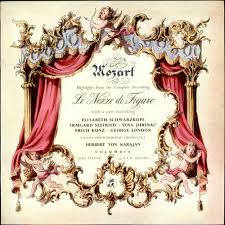
The Marriage of Figaro was the first of Mozart’s collaborations with the formidable librettist, Lorenzo da Ponte, and shows both geniuses at the height of their powers. Da Ponte based his libretto on Pierre Beaumarchais’ seminal play of the same title. With its topical references and oblique indictment of the French aristocracy, the play was considered scandalous when it opened in 1784. Although Da Ponte and Mozart’s version, written two years later, keenly depicts the underlying tension between the sexes and social classes, it focuses less on the period’s political issues and more on the complex humanity of its characters. Mozart and da Ponte’s Figaro, which provides insight into the tenuousness of human relationships via hilarious situational comedy, is at once an eminently delightful, yet profoundly moving work. Mozart’s brilliant score mirrors the complex world it depicts. Full of stunning arias and intricate yet transparent ensembles, Figaro is one of the crowning achievements of one of the world’s great artists.
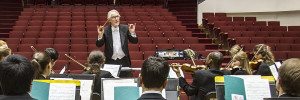
James Smith. Photo by Michael R. Anderson.
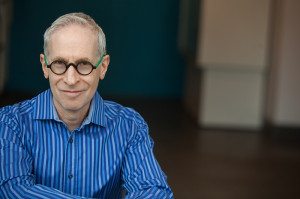
David Ronis. Photo by Luke DeLalio.
Although written before Rossini’s The Barber of Seville, The Marriage of Figaro represents the continuation of that story. In Figaro, Count Almaviva, having married Rosina, has taken to philandering. His downtrodden wife conspires with Figaro, now his valet, and Figaro’s bride-to-be, Susanna, the Count’s current amorous target, to teach him a lesson. In the process, all of the relationships in the opera are called into question and undergo both subtle and not so subtle changes. All is resolved in the end when the Countess’s love and devotion wins out as she is reunited with her repentant husband.
Viewing Figaro as a work that is intimately tied to the 18th-century, Director Ronis has assembled a design team to create a traditional setting for the production. But he also sees it as a piece with tremendous relevance today. “Even though it can be difficult for modern audiences to relate to men in frock coats and women in hoop skirts, by realistically focusing on the characters’ joys, pains, and struggles, it is possible to deliver messages of The Marriage of Figaro in a way that is both entertaining and meaningful in the 21st century,” he says.
The large cast of The Marriage of Figaro includes Joel Rathmann and alumnus Benjamin Schultz, who will split performances of the title role; Erin Bryan and Anna Whiteway as Susanna; Brian Schneider and Gavin Waid as Count Almaviva; and Anna Polum and Yanzelmalee Rivera as the Countess. The role of Cherubino will be split between Alaina Carlson and Kirsten Larson. In supporting roles, the production will feature Tia Cleveland and Meghan Hilker as Marcellina, alum Thomas Weis as Bartolo, Dennis Gotkowski and Fabian Qamar as Basilio, Kyle Connors and Mikko Utevsky as Antonio, Emi Chen and Emily Weaver as Barbarina, Todd Keller and Jiabao Zhang as Don Curzio.
Assisting Maestro Smith will be Kyle Knox, assistant conductor; Professor John Stowe, harpsichord continuo; Andrew Briggs, cello continuo; Chan Mi Jean and Kangwoo Jin, musical preparation; and Sara Guttenberg, chorus master.
The production will be designed by Dana Fralick, scenery and props; John Frautschy, lighting; Hyewon Park and Sydney Kreiger, costumes; and Jan Ross, wigs. The production stage manager will be Isabel Karp and the assistant director, Elisheva Pront. Additional student staff includes Sarah Kunath, master electrician, and Emi Chen, costume assistant.
Tickets are $25.00 for the general public, $20.00 for senior citizens and $10.00 for UW-Madison students, available in advance through the Campus Arts Ticketing office at (608) 265-ARTS and online at http://www.arts.wisc.edu/ (click “box office”). Tickets may also be purchased in person at the Wisconsin Union Theater Box Office Monday-Friday, 11:30 a.m.-5:30 p.m. and Saturdays, 12:00-5:00 p.m. and the Vilas Hall Box Office, Monday-Friday, 11:30 a.m.-5:30 p.m., and after 5:30 p.m. on University Theatre performance evenings. Because shows often sell out, advance purchase is recommended. If unsold tickets remain, they may be purchased at the door beginning one hour before the performance.
The Carol Rennebohm Auditorium is located in Music Hall, at the foot of Bascom Hill on Park Street.
University Opera is a cultural service of the School of Music at the University of Wisconsin-Madison whose mission is to provide comprehensive operatic training and performance opportunities for our students and operatic programming to the community. For more information, please contact opera@music.wisc.edu. Or visit the School of Music’s web site at www.music.wisc.edu/
Brenda Rae, a School of Music voice alumna whose 2013 U.S. operatic debut in the Santa Fe Opera’s production of Giuseppe Verdi’s “La Traviata” received high praise from the New York Times, will star this September in a major fundraising concert for University Opera.
“Ms. Rae soared beautifully in the early going, but it was in her pianissimo singing that she really shone,” wrote James R. Oestreich, of Brenda’s role as Violetta, the high-class prostitute dying of consumption.
Listen to Brenda sing the role of Semele at the Seattle Opera.
Brenda Rae, an Appleton native, earned a bachelor’s degree in voice from the School of Music in 2004 followed by a master’s degree and artist’s diploma from The Juilliard School. She then moved to Europe where she has performed regularly in Frankfurt, Munich, Berlin and many other cities.
The three-day event will celebrate the newly created position of Director of University Opera, funded by the recently established Karen K. Bishop Fund. Karen Bishop was the founder of Rainbow Play Systems, makers of playground equipment, but sold it in 2003 to pursue her first love, opera. She gained masters and doctoral degrees at UW-Madison, and prior to her death in January 2015 after a struggle with cancer, she asked her husband Charlie Bishop to support the university opera program.
Charlie Bishop’s initial gift of $500,000 was coupled with several hundred thousand dollars raised by local supporters, including several individual member donations and a joint board donation from Opera Props, a local support group, as well as a bequest from the estate of Margaret Winston, another longtime benefactor who died in September 2014. With Bishop’s pledge, the fund secured a dollar-for-dollar matching grant from the John and Tashia Morgridge Foundation to create the Karen K. Bishop Fund for the Director of University Opera.
This fall, the School of Music will initiate a national search for a permanent opera director.
The public portion of the three-day University Opera event includes a ticketed concert on Sunday, Sept. 27, at 7:30 p.m. in Mills Hall and a free master class on September 25. The program with the UW Symphony Orchestra includes the Concerto for Coloratura Soprano by Reinhold Glière, to be sung by Ms. Rae, La Mer by Claude Debussy, and Symphonic Dances by Sergei Rachmaninoff. The public is invited to a reception following the concert. Tickets are $25, available through the Memorial Union box office. Students are admitted free.
While at UW-Madison, Brenda Rae won the annual Concerto Competition and performed leading roles with University Opera including Constance in “Dialogues of the Carmelites,” Despina in “Cosi fan tutte,” and Nannetta in “Falstaff.”
“It was thrilling to hear a singer with Brenda’s towering vocal attributes at the beginning of her career,” says Mimmi Fulmer, professor of voice and opera, who was Brenda’s teacher at UW-Madison.
Brenda Rae, who dropped the last name Klinkert after leaving Wisconsin, was also featured in a 2014 article in the Metropolitan Opera Guild’s magazine, Opera News, following her performance in Santa Fe. “Rae proved her prima donna mettle in Santa Fe last summer, when she knocked local opera fans back on their heels with her superb Violetta in Verdi’s La Traviata, presented in a revival of Laurent Pelly’s edgy modern-dress staging from 2009,” the author, F. Paul Driscoll, wrote. “Rae bounded into the action of Act I with a fashion model’s lanky hauteur, her strikingly pale shoulders marked with a red floral tattoo, and sang as if her life depended on it.”
In the article, Brenda remembered her time at the School of Music.
“Before I was at Juilliard, when I was a student at the University of Wisconsin–Madison, I hadn’t really decided to focus on classical voice,” she said. “But my teachers there were pretty smart. By the end of my sophomore year, they had given me a scene from Sonnambula to do. And I fell in love with opera.”
The University Opera program was established in the early 1960s with Karlos Moser as director. Moser retired in 1997 and was followed by William Farlow, who retired in 2014. The position is now filled by David Ronis, visiting assistant professor of opera.
Graduates have included current Broadway star Nathaniel Stampley; Gregory Schmidt, now with the Metropolitan Opera; Jamie-Rose Guarrine, who will join the faculty of University of Massachusetts-Amherst this fall; James Kyrshak, who recently joined the Vienna State Opera; and Emily Birsan, currently performing with the Ryan Center of Chicago’s Lyric Opera, as well as many others.
For more information, please email Katherine Esposito or call 608.263.5615.
David Ronis, the visiting director of University Opera at the UW-Madison School of Music, doesn’t want his opera singers to just “park and bark” their arias. He wants them to truly express the various hidden narrative levels of the opera’s libretto and musical score.
In short, he wants them to act as actors do.
It’s not a new idea, Ronis says. In fact, he says, the overall trend in opera over the last 30 years has been for opera singers to develop acting skills as keen as their vocal ones–and he considers himself to be part of that movement.

David Ronis. Photo by Luke DeLalio.
At one point, working in this way was a departure for Ronis himself. He’d been singing professionally in opera for years before he landed a job in the Los Angeles company of Disney’s Beauty and the Beast, where he suddenly was surrounded by actors with real technique. After three years there he returned to New York and began to study acting seriously and added acting jobs – spoken theater, commercials, and independent films – to his resume.
It was life-changing. He began to look at operatic acting with new eyes, and discovered he was a bit embarrassed by the quality of much of the work that he saw.
“So I joined some friends – other teachers and directors – whose mission in life was to train opera singers to become better actors,” Ronis says. “And my background, being a singer myself as well as a trained actor, has facilitated that. So that’s what I work on now: how to use yourself, your imagination, your emotions, and your body, to act the story more effectively.”
For Albert Herring, this season’s University Opera production and Ronis’s first at UW-Madison, that means detailed stage work. “Comedy is harder than drama,” he says. “When you’re singing an aria about how lonely you are and how you want to commit suicide, it usually has a slower, more sustained inner tempo. Although the emotions are intense, it doesn’t require the same kind of technical skill as comedy.”
“In comedy, things happen quickly. Characters exchange thoughts, react to each other, and things are constantly bouncing back and forth,” he continues. “So we’re spending a lot of time working on those interchanges, and how they manifest in action. The trick is to do it cleanly and with proper timing.”
What does Ronis find funny? “I love comedy that arises out of situation,” he says. “The first time I saw the play Noises Off, I thought I had died and gone to heaven. I also have a few favorite standup comedians – Chris Rock, Kathy Griffin, Louis CK – as well as few sitcoms like ’30 Rock’ that I think are deeply funny. The classic TV comedies from the 50s and 60s are fantastic! Yesterday, in rehearsal, I found myself saying to one of the students, ‘Okay, you’re Lucy! This is a Lucy moment!’ ”
Did they have any idea what you were talking about? “They did! Yes!”
Learn more about University Opera’s Albert Herring, including how to buy tickets.
We asked David to tell us a bit more about this background and his plans for the UW-Madison School of Music. Here’s his response.
Q: Welcome to Madison, David! You’re such a New Yorker – how does it feel to be in the Midwest?
A: I’ve actually spent quite a bit of time in the Midwest. When I was actively performing, I sang all over the country, frequently spending a good month or more in a given city. So I got pretty comfortable living outside of New York. I’ve been to Wisconsin a number of times – I sang at both the Skylight and Florentine Opera companies as well as on tour with the New York City Opera National Company in Madison (at the Oscar Mayer Theater) And also in Platteville!
Q: Did you have any connections with the School of Music before you came here?
A: Yes, my good friends Paul and Cheryl Rowe have been here for 16 years. Paul is on the voice faculty and Cheryl is a terrific singer and voice teacher in her own right. It was Paul and Cheryl who encouraged me to apply for the interim position. And I’m glad they did!
Q: What are your plans this year for University Opera?
A: Well, we’ve selected two shows that I think are perfect for the UW students and for the community. In October, we’re doing Benjamin Britten’s Albert Herring and in March, Mozart’s masterpiece, The Magic Flute. Albert Herring is a terrific comedy with a social message or two that’s truly an ensemble piece. Technically, it’s a chamber opera, because the orchestra consists of only 13 players.
Albert Herring is also a perfect piece for the intimate Music Hall at UW-Madison which seats 380. Grand opera it isn’t. What it is, is a terrific opportunity for young singers and instrumentalists to develop their skills and put on an entertaining, meaningful work. We’re very happy to bring this piece to the Madison community. The conductor for Albert Herring is Kyle Knox, a remarkably talented graduate student, studying with orchestra conductor James Smith. It’s been a delight collaborating with Kyle on this project and I look forward to working with Jim in the spring.
I actually have a special connection with this work. When I was a young singer, I had the opportunity to travel to the Britten-Pears School in Aldeburgh, England in order perform the title role of Albert Herring as well as to study it with Peter Pears, the original Albert. It was a minimal workshop production, directed by Eric Crozier, Britten’s librettist, and Nancy Evans, another original cast member, yet quite memorable for me. I’m very happy to share my one degree of separation from the creation of the work with UW students. It was fantastic to do Albert Herring in the part of England where it not only takes place, but where Britten, Pears, Crozier and the English Opera Group lived and worked.
The spring production, The Magic Flute, will be sung in German with English dialogue. Since we have a full orchestra for the spring production, I wanted to do a piece that had a fairly large cast and chorus, thus offering lots of opportunities for UW students to perform. The Magic Flute is the perfect piece – well-loved and family friendly. One of our missions is to develop new, young audiences, and this opera goes a long way to accomplish that task. We look forward to bringing this work to the Music Hall.
Q: As a Visiting Assistant Professor with a one-year appointment, how do you see your role, as far as continuing and developing University Opera?
A: It’s an interesting position to be in. This is truly a year of transition for University Opera. After 16 successful years under William Farlow, I want to make sure that the program continues to grow and develop. One year is long enough to begin a few new initiatives that will hopefully be continued in the years to come. At the top of my list are the program’s educational priorities – to provide ways to help students develop their skills and to provide performance opportunities for them. In order to involve as many students as possible in the program, we’ve double cast some roles in Albert Herring and I’m expecting to do the same in The Magic Flute. As part of the Opera Workshop class (which produces an Opera Scenes program twice a year in addition to the mainstage productions), I’ve started teaching an Acting for Singers class. Seeing that my personal mission has been to develop better acting standards among opera singers, I’m excited to have the opportunity to help the students with their stage skills. Also, pursuing the part of the mission of University Opera that values community service, I would like to reach out to various arts and civic groups, both on campus and off, to see what kinds of collaborations may be possible – connections that would be mutually beneficial.
Q: Do you have any other observations regarding University Opera or the School of Music in general?
A: Well, I continue to be impressed with the students. They seem hungry for knowledge and to develop their skills. As a group, they are very hard working, and I think that you’ll see the results in performance. Susan Cook, the Director of the School of Music, Ben Schultz, the Assistant Director, and the other administrative staff have been very welcoming and helpful as I adjust to new systems and procedures. Likewise the School of Music faculty members I’ve met. I’m very happy to be among this group and look forward to an exciting year!
Brass, jazz and three composers–American George Crumb, Cecilia McDowall of the United Kingdom, and France’s Jean-Philippe Rameau — will be showcased this year at the UW-Madison School of Music in the form of five multi-event guest artist festivals, starting in October and continuing through April. Funding is provided by the Vilas Trust and Anonymous Fund at UW-Madison. We thank them for their support.
Other notable events will include an eight-concert faculty/student “Showcase Series” series, presenting some of the most dynamic music that the School has to offer. Click here for Showcase info.
Some events are ticketed (click here for info). Tickets will go on sale one month ahead of time. All other events at the School of Music, including dozens of faculty recitals, student ensembles and individual guest artists, continue to be free.
Our 2014-15 festivals include:
“Celebrate Brass”
Wednesday, October 8 — Monday, October 13, 2014
Brass music is often known for its swagger, but it is also famous for delicate polyphonies and burnished tones. We invite the public to experience the beauty of brass first-hand at a festival featuring both a full array of music and musicians, many at the height of their careers.
Performers will include famed Norwegian tubist Øystein Baadsvik, the only musician to have created a career as a tuba soloist, rather than becoming a member of an orchestra or accepting a teaching post. His multi-faceted musical career as a soloist, chamber musician and recording artist has taken him all over the world. Øystein Baadsvik’s international career began in 1991 when he was awarded two prizes at the prestigious Concours International d’Exécution Musicale in Geneva.
Baadsvik will be joined by hornist Jessica Valeri (BM, UW-Madison, 1997) of the San Francisco Symphony Orchestra, Michigan’s Western Brass Quintet, UW-Madison’s Wisconsin Brass Quintet, renowned brass composer and blogger Anthony Plog, new UW-Madison faculty tubist Tom Curry, as well the best brass players and conductors at the University, including a Brass Choir led by conductor Scott Teeple.
Events will include concerts, solo recitals, masterclasses, brass coachings, a colloquium and a reception.
Click here for full schedule.
The 4th Annual UW-Madison/Madison Metropolitan School Jazz Festival
Wednesday, December 3 — Saturday, December 6, 2014
A festival featuring workshops and performances for college and high school jazz performers. This marks the first time that UW-Madison will host the event.
This festival will feature Ingrid Jensen, trumpeter, bandleader, artist-in-residence at the University of Michigan and part-time faculty member at the Peabody Conservatory. Ingrid Jensen has been a major figure on the international jazz scene for over 20 years. Her three CDs for the ENJA label and her latest CD, “At Sea,” won her nominations from the Canadian Juno Awards, including an award in 1995 for Vernal Fields. In addition to her work as a leader of the quartet Project O and the quintet Nordic Connect, Jensen is a featured soloist with the Maria Schneider Orchestra, with whom she recorded four albums, including the Grammy Award-winning “Concert in the Garden” and “Sky Blue,” the former of which was also named Jazz Album of the Year by the Jazz Journalists Association.
Jensen is a member of the Mosaic project with Terri-Lynn Carrington, Esperanza Spaulding and Geri Allen; the Darcy James Argue’s Grammy-nominated Secret Society; the Juno-award winning Christine Jensen Orchestra; has been featured on Gil Evans’ Porgy and Bess at the San Francisco Jazz Festival, under the direction of Maria Schneider; and has appeared as a guest in the festival’s “Tribute to Woody Shaw and Freddie Hubbard”, alongside Terence Blanchard, Eddie Henderson, Bobby Hutcherson and Kenny Garrett.
The festival will include master classes in jazz trumpet and improvisation, open rehearsals, a Saturday high school clinic, and performances with UW jazz ensembles and high school big bands from Madison and Middleton.
This festival is free and open to the public.
Click here for full schedule.
“Seventy Degrees Below Zero”: A concert series and residency showcasing the music of British composer Cecilia McDowall
Friday, February 19 through Sunday, February 23, 2015
In 2009, after premiering a McDowall work, “Framed,” UW-Madison trumpet professor John Aley discovered for himself what he describes as the “challenging, energizing, poetic, clever, tongue in cheek, and utterly beautiful” music of Cecilia McDowall.
Our festival, organized by Aley, will feature the first-ever United States residency of British composer Cecilia McDowall and the US premiere of her symphonic work “Seventy Degrees Below Zero,” commissioned by the City of London Sinfonia and the Scott Polar Research Institute, based in Cambridge, England.
Often inspired by extra-musical influences, McDowall’s writing combines a rhythmic vitality with expressive lyricism. She has won many awards and has been short-listed several times for the British Composer Awards. Her music has been commissioned and performed by leading choirs, including the BBC Singers, ensembles and at major festivals both in Britain and abroad and has been broadcast on BBC Radio and worldwide.
“Seventy Degrees Below Zero” is a cantata for solo voice (to be sung by faculty tenor Jim Doing) and orchestra, inspired by a phrase written by British captain Robert Falcon Scott to his wife, prior to his death while returning from an expedition to the South Pole: ‘Dear, it is not easy to write because of the cold – 70 degrees below zero.’ ”
Joining us on Saturday will be Michael DuVernois of the UW-Madison IceCube Particle Astrophysics Center, only recently returned from the Antarctic, who will present an entertaining and educational talk, complete with historic and modern photographs, on the progression of Antarctic exploration from the heroic age through modern science on the coldest, highest, driest continent.
Other works to be performed during the three-day festival include the first US performances of “Regina Caeli,” for four trumpets and four trombones, and “Cavatina at Midnight,” for clarinet, cello and piano. Her haunting choral works “Ave Regina” and “Ave Maris Stella” will be performed by the UW Chamber Choir, directed by Bruce Gladstone. In addition to Jim Doing, faculty performers will include pianists Christopher Taylor and Martha Fischer, clarinetist Linda Bartley, soprano Elizabeth Hagedorn, oboist Kostas Tiliakos, trombonist Mark Hetzler, trumpeter John Aley, cellist Parry Karp, percussionist Anthony Di Sanza, violist Sally Chisholm, and others.
In 2008, the Phoenix Chorale won a Grammy Award for “Best Small Ensemble Performance” for its Chandos CD, “Spotless Rose: Hymns to the Virgin Mary,” which included a work, “Three Latin Motets” by Cecilia McDowall.
Click here for full schedule.
Read a review in The Guardian newspaper of the UK premiere of “Seventy Degrees Below Zero.”
“Honoring George Crumb at 85”
Sunday, March 22 and Monday, March 23, 2015
George Crumb has been a major force in American composition since the 1960s when his Ancient Voices of Children set to texts by Garcia Lorca provided an evocative and deeply personal response to late modernist serialism. The winner of both a Pulitzer Prize and Grammy, Crumb continues to compose new works, most recently his American Songbooks, that celebrate the magic and mystery of life. Crumb’s music often juxtaposes contrasting musical styles and quotes from pre-existing works, and his use of extended instrumental techniques shows his predilection for new sound colors. Many of Crumb’s works include programmatic, symbolic, mystical and theatrical elements, which are often reflected in his beautiful and meticulously notated scores.
Crumb’s 85th birthday provides an opportunity to celebrate this composer through concerts, workshops, and master classes featuring guest artists as well as our own faculty and students. The program will include a performance of the “Crumb Madrigals” by Chicago duo Due East and a concert by New York-based violinist Miranda Cuckson, as well as a performance of “The Violinists in My Life,” written by faculty composer Laura Schwendinger.
Cuckson is highly acclaimed for her performances of a wide range of repertoire, from early eras to the most current creations. In demand as a soloist and chamber musician, she appears in major concert halls, as well as at universities, galleries and informal spaces. She has performed at such venues as the Berlin Philharmonie, Carnegie Hall, the Library of Congress, Miller Theatre, the 92nd Street Y, Guggenheim Museum, and many more.
Nunc (Latin for “now”) was founded in 2007 as “Transit Circle ” by artistic director and violinist/violist Miranda Cuckson, and was renamed and incorporated as a not-for-profit organization in 2012. Nunc is devoted to presenting high-caliber performances of music of current, recent and older eras, through distinctive programming that highlights their innovations and contributions.
Due East (Erin Lesser, flutes; Greg Beyer, percussion) actively promotes new music and seeks to expand the flute and percussion duo genre through frequent commissions and premieres. Their first recording, Simultaneous Worlds, is available on Albany Records. Their second recording, Drawn Only Once, is a multi-media CD/DVD now available on New Amsterdam Records. Noted critic Steve Smith gave it a rare 5.0-star rating in Time Out New York, calling it “spellbindingly beautiful.”
Click here for full schedule.
Read a review of Miranda Cuckson in the New York Times.
“Rediscovering Rameau”
Multiple events; check back later for more details.
A year-long festival marking the 250th anniversary of the death of French Baroque composer Jean-Philippe Rameau.
The UW-Madison and community partners will offer a series of public events beginning this fall and culminating in April with two concert performances of Rameau’s one-act opera, Pygmalion, by the Madison Bach Musicians.
Learn more about Rameau here.
